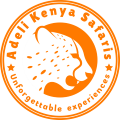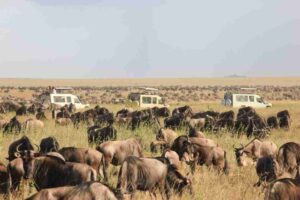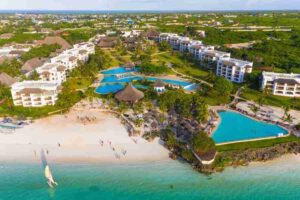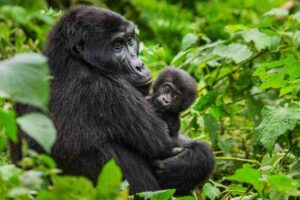| Name of the facility | Elewana Lewa Safari Camp |
|---|---|
| Certification Achieved | Gold |
| Year opened | 2007 |
| Tourism region | North Rift |
| County | Laikipia |
| Address | Lewa wildlife conservancy Map It |
| Telephone/Mobile | +254 (0)20 6003090/1 |
| reservations@elewana.com | |
| Website | https://www.elewanacollection.com/lewa-safari-camp/at-a-glance |
| Facility Notes | Lewa Safari camp is located inside Lewa Wildlife Conservancy in Nothern Kenya. This private conservancy spans over 62000 acres and incorporates the Ngare Ndare Forest. It is home to a wide variety of wildlife including the rare and endangered black rhino, Grevy’s zebra and sitatunga (marsh buck). It also hosts lions, leopards, elephants, rhinos and buffalo. Lewa conservancy model combines the protection of wildlife, community development, and sustainable tourism. The conservancy aims to educate neighbouring communities on the socio-economic benefits of wildlife conservation as well as minimizing human-wildlife conflict. Lewa Safari Camp boasts of 12 exquisite rooms with a total bed capacity of 26 and a staff of 55 employees. |
| Energy management | Lewa Safari Camp is powered by both solar energy and generator fixed with power inverter battery system. Solar power is used for lighting, and running refrigerants. The facility operates the generator for nine (9) hours a day. The camp has invested in twelve (12) solar water heaters with a capacity of 300 litres each. The facility also has a charcoal fridge for storing fruit and vegetables that uses drip irrigation for cooling. Water for the staff is heated using an efficient kuni boiler. This boiler has a capacity of approximately 500 litres and runs on fuel wood obtained through the conservancy. Low wattage energy saving bulbs are fixed throughout the premises. Guests as well as staff members are sensitized on the importance of energy conservation |
| Environmental management | Lewa Safari Camp has an environmental policy showing commitment to environmental and, health and safety aspects. The policy lays emphasis on principles such compliance with relevant legal requirements, enhancing nature conservation, improving local communities’ wellbeing, among the guests and for continued improvement of the tourism business. The camp has conducted its annual environmental audit as required by law under EMCA 1999 (Environmental Management and Co-ordination Act.). The facility also has an environmental management system with management plans in water, waste management, and emergency response, and health & safety measures. |
| Chemical use | The camp uses biodegradable bathroom amenities from Leleshwa Soaps such as bathing soaps and shampoos in the guest cottages. The reservoirs for fuel are contained in a non –porous, bunded structure to prevent accidental spillage. |
| Conservation Criteria | |
| Community Criteria | |
| Solid waste management | Waste separation (paper, plastics, metals and glass) is conducted at source and the bins are clearly labeled. The waste is further separated at the waste holding area. Organic waste is composted in a three chamber composting system fitted with a cover to keep off wildlife. Plastic, glass, metallic and electronic waste is disposed to recycling firms through the head office in Nairobi |
| Water management | The main water source for the camp is a borehole within Lewa Wildlife Conservancy. The water is metered at the main inlet and recording conducted daily to monitor usage. The camp submits quarterly records to the conservancy for monitoring purposes. Rain water harvesting is done at the staff quarters to supplement the borehole water. Visitors are sensitized on water conservation during arrival briefings, through information folders in the tents as well as “towel talks” encouraging guests on the re-use of towels to conserve water. |
| Visitor communication & education | Visitors are briefed upon arrival on the facility operations, The Lewa Conservancy model & code of conduct and environmental values. Sensitization is also emphasized during meals times both by the management and staff. The guest tents are equipped with room information folders to brief the visitors on environmental conservation activities and initiatives. The camp has various publications and magazines notice for visitors’ information package. Lewa Safari Camp has a resource area equipped with reading information materials such as Africa Geographic magazines, Books on biodiversity found in Kenya including birds, mammals and plant life. |
| Pollution | To prevent soil and water pollution, the car wash within the facility is fixed with an oil interceptor to remove possible used oil leakage. The path lights are covered to reduce on night light pollution. Furthermore, generators are in a sound proof room fixed with a muffler to combat noise pollution. |
| Environmental conservation | The permanent tented camp is built on low environmental footprint. The tents are made of green, beige and brown colors combined with grass roof thatch that blends in with the natural environment. Natural vegetation within is relatively undisturbed. Guests are encouraged to participate in low impact activities such as guided nature walks, back-house tour, and bird watching. The camp car-pools its guests (6visitors per vehicle) to reduce on the number of vehicles on game drives within the conservancy. In addition, the camp supports conservation initiatives done by LWF (Laikipia Wildlife Forum) and NRT (Northern Rangelands Trust). In addition, forty percent of the camp’s profits go back to conservation annually |
| Waste water management | Grey water from the guest kitchen is managed through a grease trap compartment before draining into a soak pit. The rest of the grey water from the guest tents, staff quarters and public areas drains away directly into soak – pits. In total the facility has 17 soak –pits. Black effluent from the guest tents, staff quarters and public areas is managed through septic tanks. EM 1 Biological enzyme – (Bio-clean) is added to enhance sludge digestion. The facility has 21 septic tank systems. In addition, the camp has a site drainage plan which assists to monitor the waste water treatment system. |
| Purchasing and supplies | Vegetables and fruits are packed in reusable crates while meat and dairy products are stored in cool boxes. Dry goods such as cereals are stored in re-usable containers. The facility has invested in a reverse osmosis system for treating staff water. This has significantly reduced on plastic waste. Drinking water in public areas is also served using re-usable 18 liter water dispensers. In order to facilitate this, the camp issues re-usable aluminum bottles to the visitors aimed at plastic waste reduction. The guests can also take the bottles with them as souvenirs. |
| Employment and remuneration/staff welfare | The facility has a staff welfare committee that meets regularly to deal with staff issues with the management |
| Staff education, communication and awareness training | The camp has an in-house departmental training program aimed at improving the staff skills. The camp has an adequate and conversant team of 29 trained fire marshals and 14 staff have been trained on first aid. Employees are also trained on environmental aspects such as waste management, health and safety, hygiene and housekeeping. The facility has notice boards strategically fixed within for communication purposes. The staff is sensitized and briefed during departmental/daily meetings |
| Cultural preservation and promotion/protection of local sites | The guests are sensitized on the local culture by the camps guides who form a percentage of the locals. The Camp offers village visits to ILngwesi where the visitors are sensitized on the local culture, engages in sports activities e.g. arrows and spears throwing and dances and the proceeds are directed to the locals |
| Benefits to local community/community empowerment | The facility purchases locally where possible; fruits and vegetables are bought from neighboring Borana Ranch. Products such as milk, meat for staff meals, honey is obtained from Meru through local suppliers. Curios and artifacts sold at the camp are sourced from the local communities through the Northern Rangeland Trust (NRT). The camp is a member of “Pack for a Purpose” initiative where visitors are encouraged to donate items that may be of need in their areas of travel. Lewa Safari Camp as an entity of Lewa Wildlife Conservancy contributes through payment of conservancy fees. Some of the monies are used for community development around the conservancy. Lewa Safari Camp engages in local community development specifically through the Lewa Wildlife Conservancy. On the other hand the conservancy carries out various projects such as Healthcare; Community Water Management; Women’s Micro Credit Programme; Community Forestry; Adult Literacy Classes etc. In addition, the camp; Assists the conservancy on emergency services such as through provision of vehicles Encourages guest donations through Lewa Wildlife Conservancy. Donations include; School supplies and sponsorships etc. Participates, supports and contributes during Lewa major events such as Lewa Marathon Management is part of the conservancy management board. Facilitates guest Conservancy activities such as Ngare Ndare forest nature walks, community village visits etc. The camp provides employment opportunities to the locals- approximately 70% of the permanent employees are hired from the local area. Casual labour is obtained locally. |
| Cultural Criteria | |
| Health and safety | Lewa Safari camp has an emergency plan and procedure to enhance preparedness on security and health and safety. The guest Cottages are also equipped with radio calls and whistles for emergency and communication purposes. Fire fighting equipment such as fire extinguishers and fire blankets are strategically located and well serviced Medical check-ups are conducted to the food and beverage handlers to comply with Food, Drugs, and Chemical substances Act. The camp has a team of trained fire marshals and first aiders . In addition is a well-equipped first aid kit at main office. Medical equipment such as evacuation stretchers and oxygen tanks are also available. Medical care emergencies for staff are referred to Lewa Clinic and Cottage Hospital and the camp is linked to flying doctors in case of an emergency medical evacuation. Precautionary and safety signage are well fixed in the fuel and gas storage sections. The camp has conducted a Safety and Health Audit and Fire Audit to comply with the Occupational Safety and Health Act, 2007 |
| Child labor, abuse and human rights | The facility does not employ any person below the legal working age of 18 years. |
| Business Practises Criteria | |
| Entry Date | 13th March 2018 |







